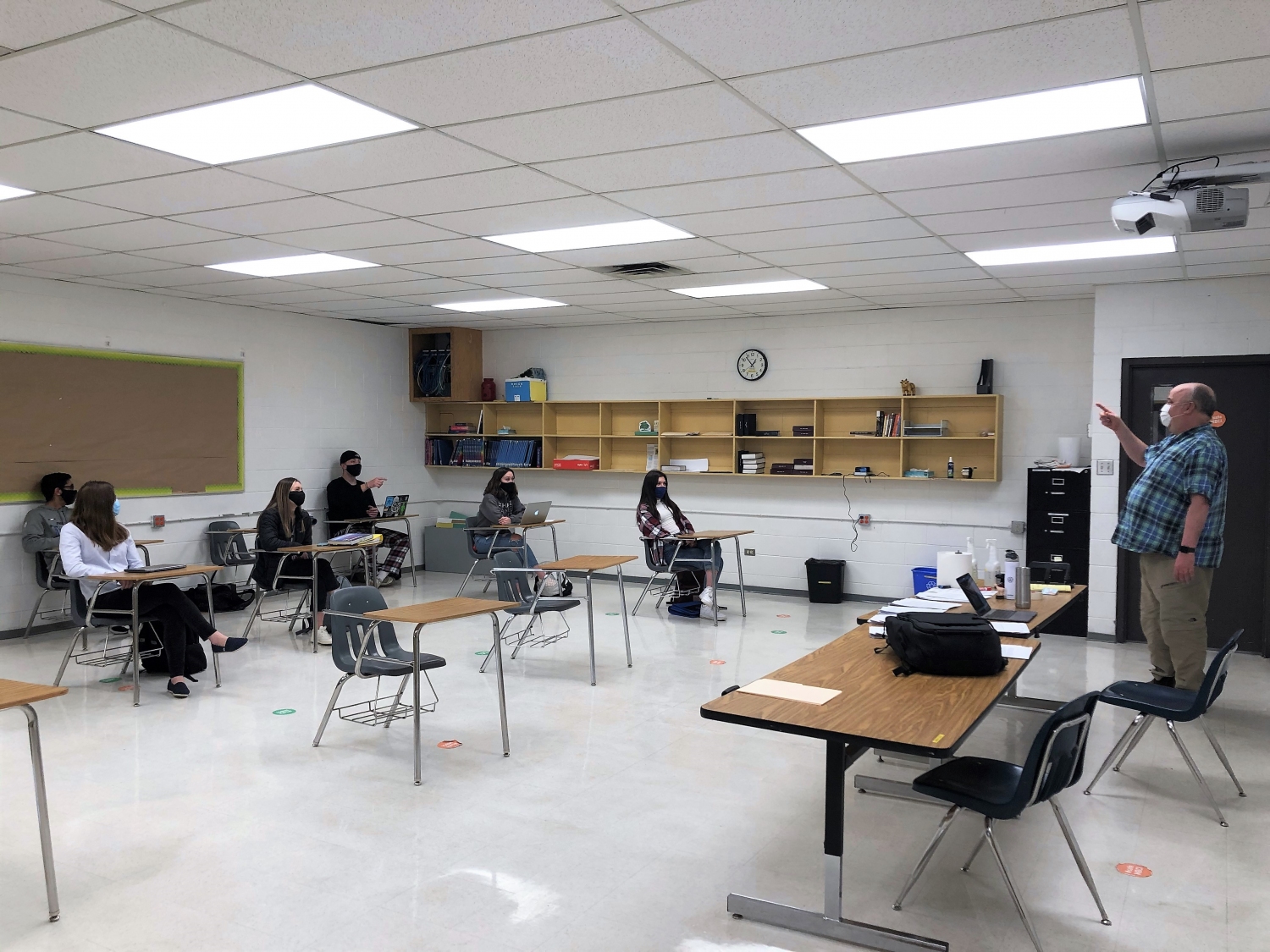News and Releases

Stories
High school teacher partners with CMU faculty on project
How high school students are engaging with the MB Confession of Faith
Monday, May 3, 2021 @ 11:24 AM | Stories
 MBCI teach Raymon Rempel (far right) has engaged his students in a critical review of the MB Confession of Faith with the help of Dr. Paul Doerksen and Dr. Andrew Dyck from Canadian Mennonite University
MBCI teach Raymon Rempel (far right) has engaged his students in a critical review of the MB Confession of Faith with the help of Dr. Paul Doerksen and Dr. Andrew Dyck from Canadian Mennonite University
High school teacher Ramon Rempel has assigned his Bible class at Mennonite Brethren Collegiate Institute a unique assignment—to critically evaluate and engage the 119-year-old Mennonite Brethren (MB) Confession of faith.
The confession, first adopted by North American Mennonite settlers from Russia in 1902, has been revised and rewritten numerous times (as recently as 1999) and consists of 18 articles in total, all of which range topically from the nature of God and evil to marriage, baptism, and nonresistance. Lately, another revision has been proposed within the Canadian MB Conference to revise article eight ("Christian Baptism"). Delegates from MB churches will decide on the proposal this June 2021.
Rempel explains that, with all of the theological decision-making happening above them, "most high school students feel separated from theological thinking. They think of their church experiences as primarily performative and so remain uninvolved when thinking about topics of faith. This project is to get them to think about themselves as participants in the life of the church."
The high school students are instructed to choose one article from the confession and to spend some time researching it, making connections between the article and relevant biblical passages, and developing arguments for whether the article should be revised, preserved, or removed.
Rempel elaborates that "we begin way back with the Nicene Creed and other early creeds and then move into the Schleitheim Confession and then, eventually, this one. We ask what a confession is, what changes and developments have happened to the confession over history? All of this is to show that confessions are not written in stone (so to speak), that they are constantly changing and being adjusted."
At the end of the assignment, CMU professors Dr. Paul Doerksen and Dr. Andrew Dyck are invited to hear the presentations in order to provide feedback and ask questions of the students.
For the most part, educators in secondary and post-secondary institutions tend to separate their tasks, leaving little continuity in the students passing through their classrooms in that important threshold between high school graduation and university orientation. This opportunity to work together as sibling institutions prepares high school students to begin thinking critically and carefully about their studies by providing a post-secondary framework that can carry on into the beginning of their undergraduate programs.
As a former Bible teacher at MBCI, Doerksen's involvement with the project further stresses the university's ability to partner with high schools.
"My experience has been a positive one," says Doerksen, "so many high school students are good thinkers, and to hear them articulate their ideas is exciting."
Reflecting on the various perspectives given from the high school students, Dyck shares that "some students perceive the confessions as heavy-handed or rules-based. They feel that the confessions need to be softened, which is usually connected to views around love given to them by their surrounding culture.
One student pointed out that the thing missing from the confession is prayer, that the MB confession has little to link the big theological claims about God to ways of faithful living."
Not all of the students in Rempel's class identify as religious. Even so, Rempel describes the value of theological thinking as "not necessarily a matter of finalizing one's own perspective, but rather, a journey of empathy."
This was the case for classmates Kristen Peitsch and Kiara Eggerman, neither of which identify as MB, who chose to present on article eleven ("Marriage, Singleness, and Family"). Peitsch, who does not identify as religious, and Eggerman, raised Ukrainian Roman Catholic, agreed with the confession that marriage should be categorized by mutual love while struggling with the notion that a believer should not marry an unbeliever or that sex should be used for the sole purpose of reproduction.
Peitsch comments that "for us to understand ourselves and our place in the world, it is important to understand the differing views of others." In this way, studying the confession is, as Rempel describes it, a "journey of empathy."
This winter marks the third rendition of Rempel's experimental assignment and it will not be the last.
As Rempel puts it, "Why do many students pursue science or other subjects more than theology? It is because other subjects have done a better job of convincing them that what they think matters. Students want meaning. They want to do things with their lives that matter. Our job is to show them that this work is not yet done. It is dynamic and unfinished, and it is in their hands."
CMU plans to continue partnering with high school educators in preparing them for post-secondary education. Students who choose to pursue a path in Biblical and Theological Studies at CMU will encounter curricula full of seminal authors and texts that will challenge them to live faithfully and critically, interdisciplinary conversations between theology and other subjects, and practicum placements readying them for a wide array of future vocations.
To learn more about CMU, visit www.cmu.ca/admissions.
KEYWORDS: Paul Doerksen, Andrew Dyck, BTS, Biblical and Theological Studies, faculty

 Print This Article
Print This Article